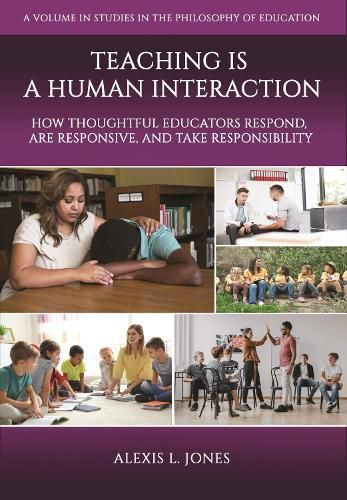Readings Newsletter
Become a Readings Member to make your shopping experience even easier.
Sign in or sign up for free!
You’re not far away from qualifying for FREE standard shipping within Australia
You’ve qualified for FREE standard shipping within Australia
The cart is loading…






This title is printed to order. This book may have been self-published. If so, we cannot guarantee the quality of the content. In the main most books will have gone through the editing process however some may not. We therefore suggest that you be aware of this before ordering this book. If in doubt check either the author or publisher’s details as we are unable to accept any returns unless they are faulty. Please contact us if you have any questions.
This book contains an argument supported by education philosophers as well as composite stories, data, and personal experiences. The author mentions a number of scholars (e.g., Benjamin, 1988; Buber, 1970; Noddings, 2005, 2013; Palmer, 1983; van Manen, 1986, 1991, 2000) who address important human issues in the field of education, and she ties their work and hers to show common themes within the issues of care, responsivity, and relational ethics. The first part of the book (Introduction and Chapters 1-3) is primarily philosophical, and the author shares the thoughts of the aforementioned scholars and others on topics relating to the very human work teachers do. The next section of the book (Chapters 4-6) combines theoretical works and empirical data to address the complexity and humanity of teaching. While the work described in the aforementioned chapters may appear to present an idea of ethical teacher perfection, this is not the case. Teachers are not supposed to be, nor are they logistically able to be, all things to all children. The final chapter instead addresses how stakeholders (e.g., educators, administrators, parents) can gently move our traditional education system toward this ideal. This conclusion shares the ways teachers and teacher educators can conceptualize the work on teaching-as-human-interaction and use it to improve the teaching perception.
$9.00 standard shipping within Australia
FREE standard shipping within Australia for orders over $100.00
Express & International shipping calculated at checkout
This title is printed to order. This book may have been self-published. If so, we cannot guarantee the quality of the content. In the main most books will have gone through the editing process however some may not. We therefore suggest that you be aware of this before ordering this book. If in doubt check either the author or publisher’s details as we are unable to accept any returns unless they are faulty. Please contact us if you have any questions.
This book contains an argument supported by education philosophers as well as composite stories, data, and personal experiences. The author mentions a number of scholars (e.g., Benjamin, 1988; Buber, 1970; Noddings, 2005, 2013; Palmer, 1983; van Manen, 1986, 1991, 2000) who address important human issues in the field of education, and she ties their work and hers to show common themes within the issues of care, responsivity, and relational ethics. The first part of the book (Introduction and Chapters 1-3) is primarily philosophical, and the author shares the thoughts of the aforementioned scholars and others on topics relating to the very human work teachers do. The next section of the book (Chapters 4-6) combines theoretical works and empirical data to address the complexity and humanity of teaching. While the work described in the aforementioned chapters may appear to present an idea of ethical teacher perfection, this is not the case. Teachers are not supposed to be, nor are they logistically able to be, all things to all children. The final chapter instead addresses how stakeholders (e.g., educators, administrators, parents) can gently move our traditional education system toward this ideal. This conclusion shares the ways teachers and teacher educators can conceptualize the work on teaching-as-human-interaction and use it to improve the teaching perception.